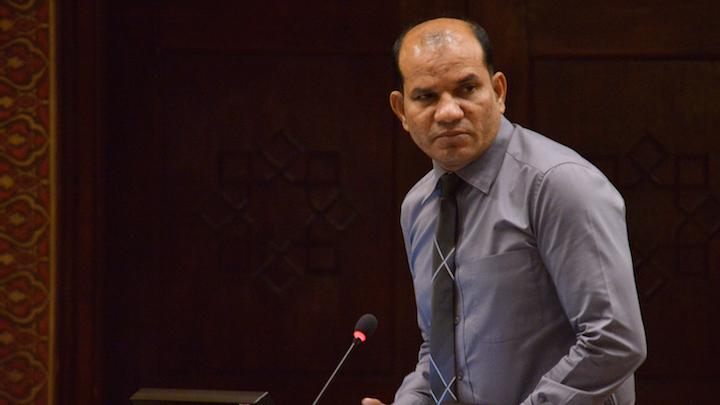The opposition Maldivian Democratic Party’s (MDP) branch in Haa Alif Dhidhoo has called for an investigation into the finances of Progressive Party of Maldives (PPM) MP Abdul Latheef Mohamed over alleged unexplained wealth.
The ruling party lawmaker has has spent between MVR3 million (US$194,552) and MVR5 million (US$324,254) in the Dhidhoo constituency during the past year, the MDP claimed, but he does not have business interests or “any other legitimate [sources of] income” apart from the parliament.
An MP earns a monthly salary of MVR62,500 (US$4,050) in addition to a committee allowance of MVR20,000 (US$1,300).
Since winning the parliament seat in March last year, Latheef has funded an MVR100,000 (US$6,485) Quran competition, an MVR100,000 football tournament, and an MVR500,000 (US$32,425) music show in Dhidhoo with the Olympians band.
Latheef has also donated an MVR700,000 (US$45,395) laboratory machine to the Haa Alif atoll hospital, offered scholarships worth MVR2 million (US$129,701) for two constituents to study medicine overseas, and organised an MVR200,000 (US$12,970) Quran competition this Ramadan.
“As the above-mentioned expenses could not have been made from the one-year salary of a People’s Majlis member, many citizens of Dhidhoo have been asking the MDP Dhidhoo branch to find out how he is getting the money,” the party’s Dhidhoo branch said in a statement on Thursday.
The statement added that many Dhidhoo constituents allege that Latheef has amassed wealth through bribery and corruption.
The Dhidhoo branch called on the Anti-Corruption Commission, the auditor general’s office, and other relevant authorities to investigate Latheef’s finances.
The constitution requires MPs to submit “a statement of all property and monies owned by him, business interests and liabilities” annually to the parliament’s secretary general, but the financial statements are not publicly disclosed.
Latheef told Minivan News today that he did not wish to comment as he had “no interest” in the MDP Dhidhoo branch’s statement.
The MP previously told opposition-aligned private broadcaster Raajje TV that allegations of corruption should be filed with the relevant state institutions.
Government, private, and foreign companies have provided assistance for charitable activities in Dhidhoo, he said.
The MDP meanwhile noted that both domestic and international organisations have expressed concern with bribery and illicit enrichment in Maldivian politics.
Last week, anti-corruption NGO Transparency Maldives called for the criminalisation of illicit enrichment and urged the government put in place a comprehensive framework for identifying and prosecuting cases.
The United Nations Convention Against Corruption – which the Maldives acceded to in 2007 – defines illicit enrichment as a “significant increase in the assets of a public official that he or she cannot reasonably explain in relation to his or lawful income.”
Ahead of last year’s parliamentary polls, Transparency Maldives also noted a lack of transparency in political and campaign financing.
“When political parties and individual candidates do not fully disclose where they get their money from, it is not clear who funds them, what their potential conflict of interests are, and, thereby allows vested interests to override public interest when elected as MPs,” the NGO observed.


